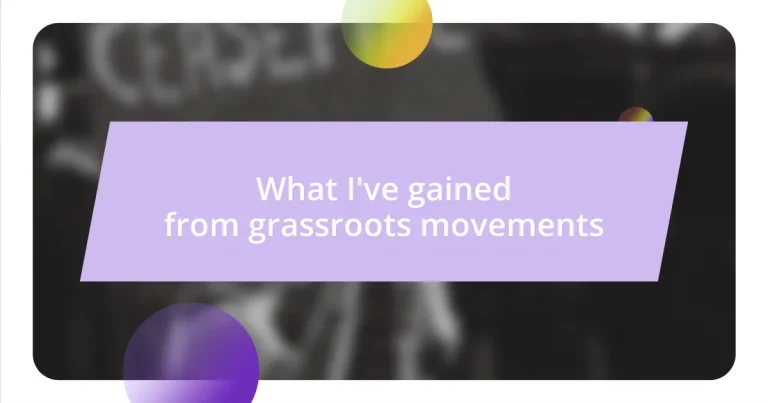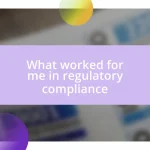Key takeaways:
- Grassroots movements unite communities around shared values, driving social change through collective action and personal connections.
- Participation in grassroots initiatives fosters personal growth, enhancing leadership, critical thinking, and civic engagement skills.
- Effective community building relies on genuine engagement, active listening, and creating safe spaces for open dialogue and diverse contributions.
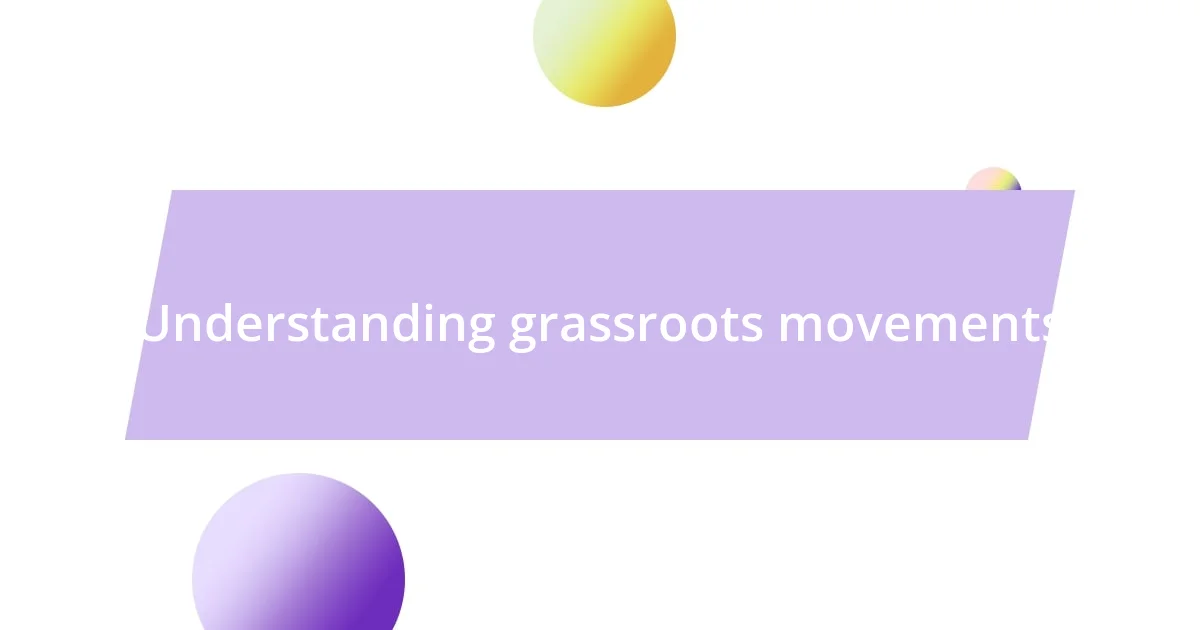
Understanding grassroots movements
Grassroots movements embody the spirit of community engagement and collective action. I remember attending a local town hall meeting where passionate individuals voiced their concerns about environmental degradation. That moment made me realize how grassroots movements start with people coming together to address issues in their own backyard, seeking change from the ground up rather than waiting for top-down initiatives.
These movements thrive on shared values and personal stories, often igniting a sense of belonging and purpose among participants. Have you ever felt the electricity in the air at a rally or community gathering? There’s something profoundly moving about hearing others’ experiences, and that connection strengthens our resolve to fight for a common cause. It’s this very fabric of human connection that makes grassroots activism not just effective but also deeply fulfilling.
Understanding grassroots movements means recognizing their power to drive social change through community voices. I’ve seen firsthand how local initiatives can influence broader policy decisions, like when neighbors rallied to preserve a green space in our city. It’s inspiring to see how small actions can create ripples, demonstrating that change isn’t just possible; it often begins with us, the grassroots.
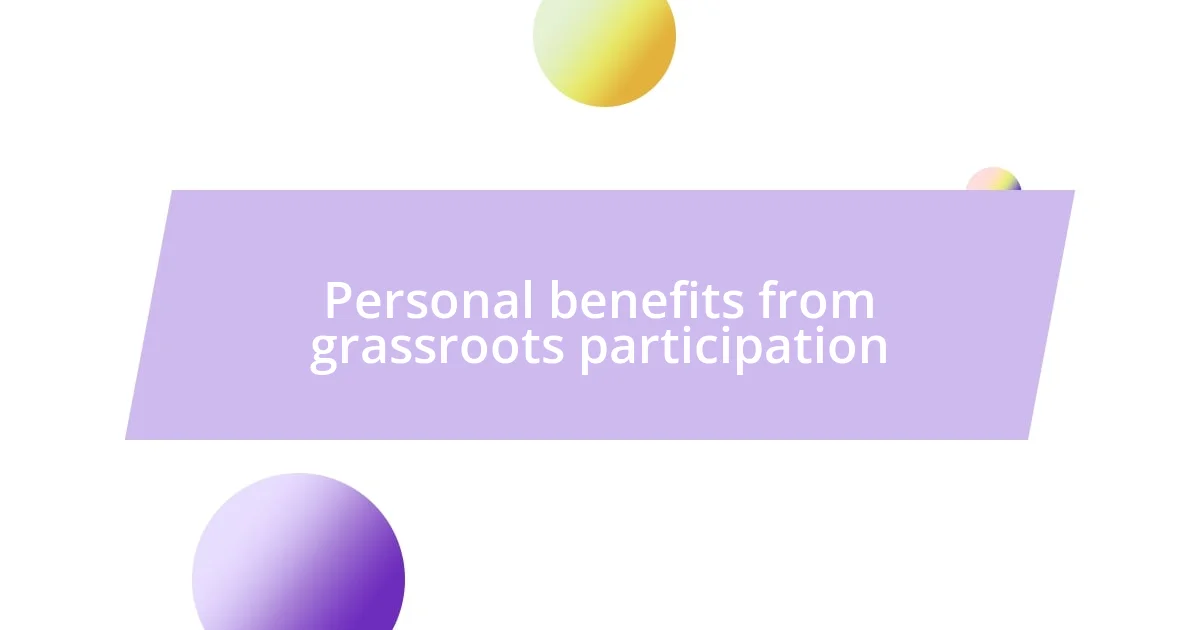
Personal benefits from grassroots participation
Participating in grassroots movements has profoundly impacted my personal growth. I’ve developed strong leadership skills by organizing local events, which pushed me out of my comfort zone. I recall standing in front of a crowd, nerves pulsing through me; yet, the energy of the united voices fueled my confidence, teaching me that vulnerability can be a powerful catalyst for change.
The relationships I’ve built through these movements are invaluable. I’ve met people from diverse backgrounds who brought unique perspectives to the table. One evening, while brainstorming strategies over coffee with a fellow advocate, I felt a deep connection blossoming – a reminder that we all have our battles, and together we can transform our struggles into collective strength.
Moreover, grassroots participation has enriched my understanding of civic engagement. I’ve gained insight into how local policies affect our lives daily. When I actively participated in a campaign against a proposed construction project, I didn’t just advocate for change; I learned about zoning laws and community rights in a way that textbooks couldn’t teach. This hands-on experience empowered me to be a more informed and active citizen.
| Personal Benefits | Examples |
|---|---|
| Skill Development | Organizing community events |
| Networking | Building relationships with diverse advocates |
| Enhanced Civic Knowledge | Understanding local policies and rights |
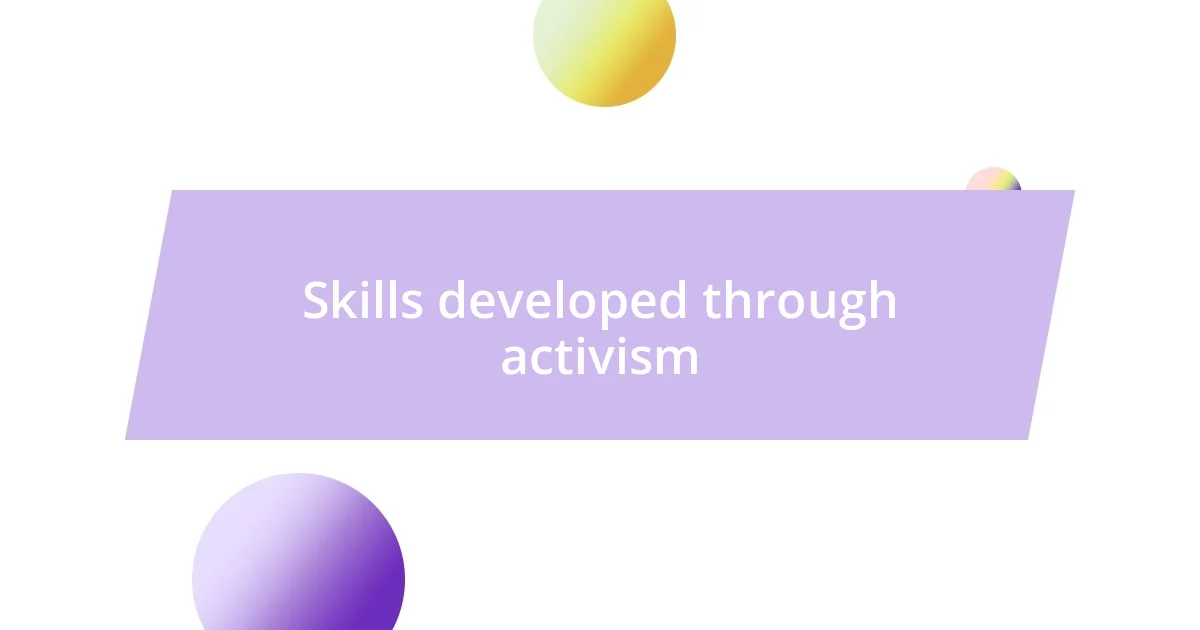
Skills developed through activism
Activism has acted as a catalyst for me, sharpening a variety of invaluable skills. I vividly remember my first time leading a community meeting. As I stood there, sweating and fumbling over my notes, I felt an unexpected surge of determination when I noticed my neighbors nodding along, eager to participate. That experience taught me not only about public speaking but also about the art of persuasion – how to convey ideas clearly and motivate others to take action.
Through this journey, I’ve also enhanced my critical thinking skills. Navigating complex issues requires carefully analyzing diverse viewpoints. For instance, during a local rally, I engaged in a heated discussion with someone who held opposing views on sustainability. Though it was challenging, those moments taught me to listen actively and articulate my points effectively. Here are the key skills I’ve developed through activism:
- Public Speaking: Enhanced confidence by addressing groups.
- Leadership: Learned to guide diverse teams toward shared goals.
- Critical Thinking: Analyzed complex issues from multiple perspectives.
- Networking: Connected with a broad range of advocates and activists.
- Collaboration: Worked effectively with others to implement change.
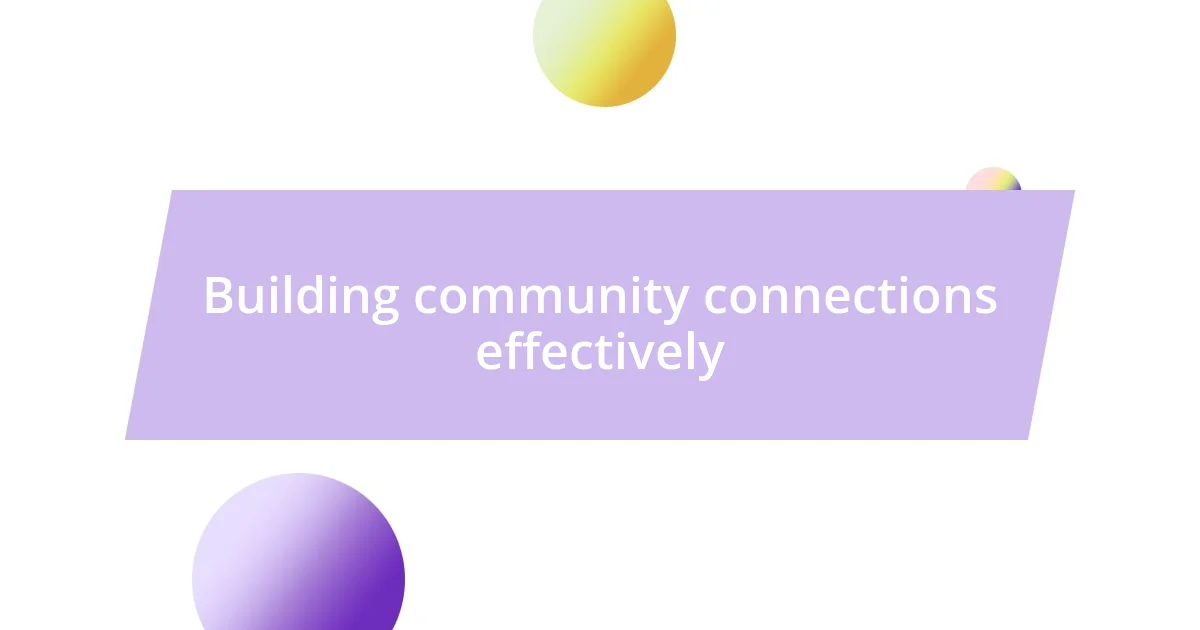
Building community connections effectively
Fostering deep connections in a community goes beyond just showing up at meetings; it’s about genuine engagement. I remember a neighborhood clean-up day where I not only picked up trash but also spent hours chatting with locals. It struck me how these conversations turned strangers into friends, each sharing stories that bonded us over shared visions for a cleaner, healthier environment. Isn’t it fascinating how simple acts can weave a tapestry of connection?
To build these connections effectively, I’ve learned that listening is just as crucial as speaking. During a planning session for a local event, I made it a point to ensure that everyone’s voice was heard, even those who were usually quiet. You’d be surprised how a simple acknowledgment can spark enthusiasm and creativity! I felt a warmth in the room as ideas flowed freely. It showcased for me that real collaboration thrives on mutual respect and encourages diverse contributions.
Moreover, I found that joint activities create a unique space for connection. Organizing a potluck not only brought various dishes to the table but also cultivated interesting conversations across demographics. Watching people mingle, swapping recipes, and laughing together was pure joy. This reinforced my belief that the more we interact in casual settings, the greater our community bonds grow. Have you ever felt that electric mix of excitement and vulnerability when sharing food with others? It’s powerful!
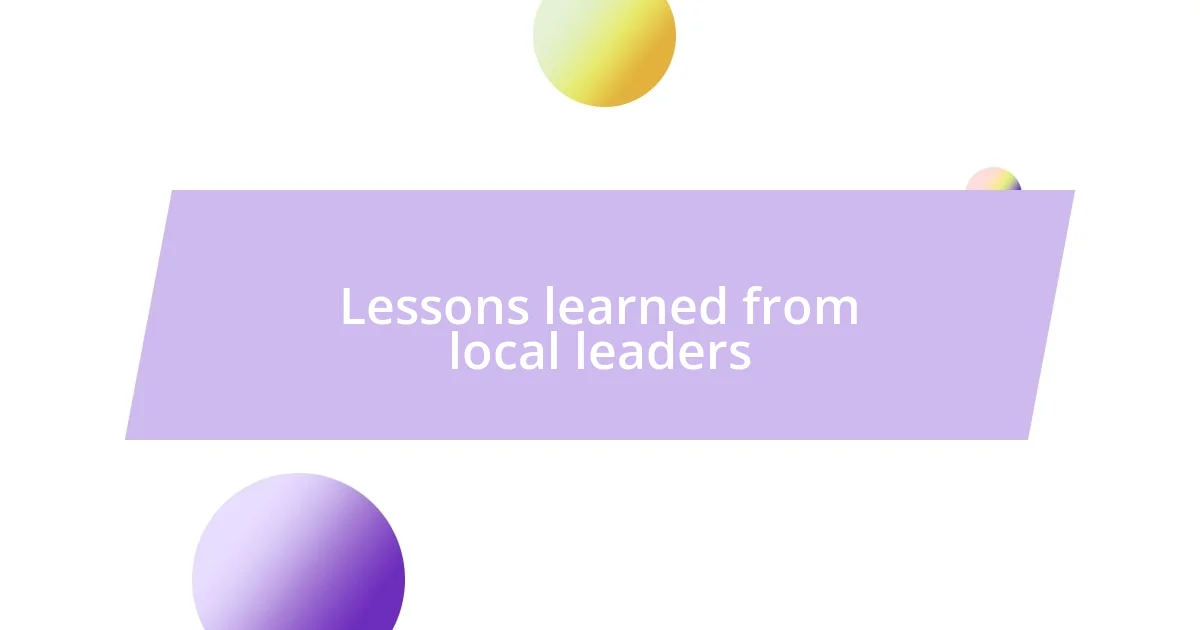
Lessons learned from local leaders
When I think about the local leaders I’ve had the privilege to learn from, it’s their resilience that stands out to me. I remember attending a community meeting where a leader faced open criticism for a new initiative. Instead of getting defensive, they listened patiently and then addressed concerns with clear, thoughtful responses. That taught me a valuable lesson: embracing vulnerability can actually strengthen one’s leadership. Isn’t it interesting how facing challenges openly can foster trust?
Another notable experience was when a local leader organized a series of workshops, aimed at building skills among community members. What struck me most was how they created a safe space for everyone to share their experiences and struggles. It was a reminder of the power of empathy in leadership. When we lead with compassion and understand others’ perspectives, we can encourage collective growth. Have you witnessed that kind of transformative power in your community?
One unforgettable lesson came from a grassroots leader who said, “Every voice matters, including yours.” This immediately resonated with me during a low point when I doubted my ability to contribute meaningfully. Their approach of elevating even the quietest voices inspired me to engage more actively. I realized that true leadership thrives on inclusivity, reminding everyone that their input can spark change. Have you ever felt that spark within you, waiting to be ignited? It’s exhilarating when you realize you can make a difference!
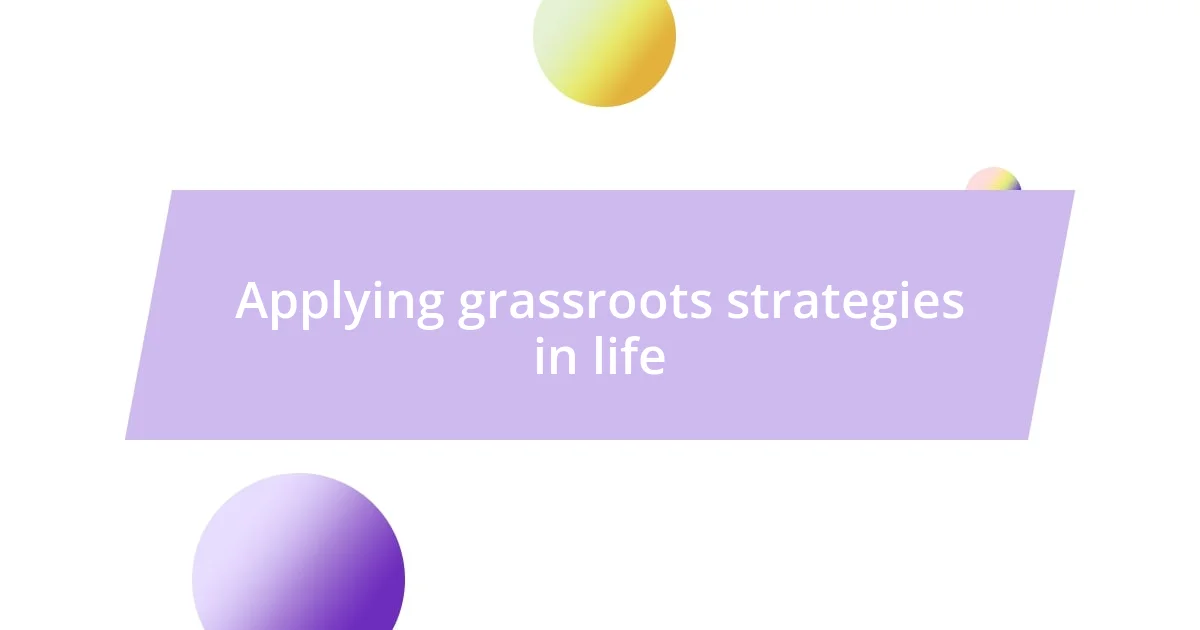
Applying grassroots strategies in life
Applying grassroots strategies in life can be transformative in so many ways. I often find myself leveraging these approaches in my daily interactions. For instance, during a local book club, I took the initiative to ask everyone about their favorite genres. That single question sparked an unexpected debate that not only deepened our connections but also broadened my own perspective on literature. Isn’t it remarkable how a simple inquiry can lead to rich discussions?
In my professional life, I’ve discovered that grassroots strategies aren’t just for community projects; they apply in the workplace too. I once suggested a team brainstorming session where each member could pitch ideas without judgment. Watching my colleagues’ faces light up as they realized their thoughts held value was a profound experience. I felt this surge of motivation among us, which led to a highly creative project unveiling. How often do we overlook the power of allowing voices to be heard?
Moreover, on a personal level, I’ve realized that grassroots strategies teach us the importance of persistence. When I was part of a fundraising campaign for a local charity, we faced numerous setbacks. Instead of letting fear of failure deter us, we continuously reached out, formed partnerships, and rallied our community. That determination not only brought in resources but also created a sense of shared purpose among us. Have you ever felt that incredible force when a community comes together for a cause? It’s a feeling that reinforces my belief in grassroots methods as a viable approach for any challenge life throws our way.












